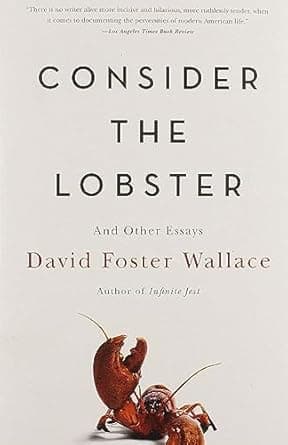
Book Stats
389
Upvotes
67
Downvotes
+322
Net Score
Consider the Lobster
by David Foster Wallace
Description
A collection of essays that showcases Wallace's brilliant mind and distinctive voice, bringing unparalleled insight and humor to subjects ranging from state fairs to literary criticism.
David Foster Wallace's essay collection demonstrates his unique ability to find profound meaning in seemingly mundane subjects. From the ethics of boiling lobsters to the psychology of talk radio, Wallace's obsessive attention to detail and relentless self-awareness create essays that are both intellectually rigorous and emotionally engaging.
The title essay, about the Maine Lobster Festival, begins as travel writing but evolves into a complex meditation on animal consciousness, consumer culture, and moral responsibility. Wallace's investigation of whether lobsters can feel pain leads to broader questions about how we rationalize our treatment of other creatures.
Wallace's piece on talk radio host John Ziegler reveals his ability to empathize with people whose views he doesn't share while maintaining critical distance. His portrait of Ziegler shows how right-wing media personalities both reflect and shape their audiences' anxieties and resentments.
The collection's literary essays, including pieces on Kafka and Dostoyevsky, demonstrate Wallace's deep engagement with literature and his belief in fiction's power to increase empathy and understanding. His analysis of how great literature works reveals his own artistic ambitions and methods.
Wallace's essay on 9/11 and its aftermath shows his ability to address serious political subjects without falling into partisan rhetoric. His focus on how ordinary people experienced and processed the attacks provides intimate perspective on a collective trauma.
Throughout the collection, Wallace's footnotes and digressions create a distinctive voice that mimics the associative patterns of consciousness while maintaining intellectual rigor. His willingness to examine his own biases and limitations makes even his most critical observations feel honest rather than superior.
Consider the Lobster showcases Wallace's belief that paying attention to the world around us—really paying attention—is both a moral obligation and a source of meaning. His essays demonstrate how careful observation and honest reflection can transform ordinary experiences into profound insights about contemporary life.